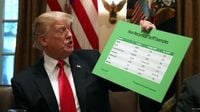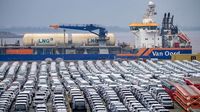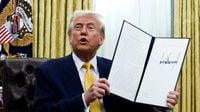In a bold move that could reshape global trade dynamics, U.S. President Donald Trump is set to unveil details of significant new tariffs on imports during a highly anticipated address on April 2, 2025, at 22:00 German time. Dubbed the "Liberation Day," this announcement is expected to have far-reaching implications, particularly for the European Union and the automotive industry.
The proposed tariffs could impose a staggering 25% duty on cars not manufactured in the U.S., a measure that threatens to hit major German automakers like Audi and BMW hard. Audi, which sold 200,000 vehicles in the U.S. last year, faces a sharp increase in import costs, while BMW, with its brands BMW and Mini, sold 400,000 vehicles. The new tariffs mean that importing these vehicles will cost 20% more starting April 2, 2025, a significant burden for these companies.
Currently, the U.S. imposes a mere 2.5% tariff on EU-made vehicles, while the EU applies a 10% tariff on U.S. cars. Trump’s administration has argued that this imbalance necessitates a reevaluation of trade policies, particularly as he accuses European nations of benefiting from unfair trade practices and subsidies.
As the automotive sector braces for impact, the implications extend beyond just tariffs. The automotive industry is a vital economic driver for regions like Bremen, where the economy heavily relies on car exports. According to economic experts, the segment of cars and car parts constitutes 72.5% of Bremen's exports to the U.S., underscoring the stakes involved. Mario Jung, an economist at the University of Kaiserslautern, highlighted the precarious nature of this relationship, stating that Bremen’s economy could face severe repercussions if the tariffs are implemented.
In a broader context, the proposed tariffs are a part of a larger pattern of trade tensions that have escalated since Trump took office. In mid-March, the U.S. introduced a 25% tariff on steel and aluminum imports, which has already sparked retaliatory measures from Canada and Mexico. These recent developments have led to fears of a full-blown trade war that could disrupt not only the U.S. economy but also the global market.
Christine Lagarde, President of the European Central Bank, has expressed deep concerns about the potential fallout from Trump’s tariffs, warning that they could lead to significant economic disruptions worldwide. Lagarde emphasized that the extent of the damage will depend on the duration and scope of the tariffs, suggesting that negotiations may ultimately be necessary to avert a trade crisis.
As anticipation builds for Trump’s announcement, political tensions are also rising within the Republican Party. Several GOP senators have voiced their apprehensions regarding the economic fallout of the proposed tariffs, warning of a potential wave of bankruptcies among American businesses. Senator Thom Tillis of North Carolina articulated the fears of many, stating, "Farmers are just one harvest away from bankruptcy," highlighting the precarious balance many sectors face under the threat of increased tariffs.
Despite these warnings, Trump remains steadfast in his approach, framing the tariffs as a necessary step toward achieving fairer trade practices. His administration has characterized the tariffs as a means to protect American jobs and bolster domestic manufacturing. In a recent statement, Trump asserted, "These tariffs will bring back jobs to American communities, leading to more money and investment in your pockets."
However, economists caution that these protective measures could backfire, leading to higher consumer prices and inflation. A recent study indicated that the average American household could incur an additional $1,200 in costs due to tariffs on imports from Canada and Mexico alone. This financial burden raises questions about the sustainability of Trump’s trade strategy and its long-term effects on the American economy.
As the clock ticks down to the announcement, the European Union is preparing its response. EU officials have signaled that they will retaliate against any unfair tariffs imposed by the U.S. Ursula von der Leyen, President of the European Commission, has indicated that the EU will not hesitate to implement countermeasures, potentially escalating the trade conflict further.
The stakes are high, not just for the automotive industry but for the broader economic landscape. The potential for a trade war looms large, and the outcome of Trump’s announcement could set the tone for international trade relations in the coming years. With global supply chains already strained due to recent economic disruptions, the introduction of new tariffs could exacerbate existing challenges.
As the world waits for Trump’s address, the implications of his tariff plans remain uncertain. While some view the measures as a necessary step toward correcting trade imbalances, others fear they could lead to significant economic fallout, both domestically and internationally. The coming days will reveal whether Trump’s "Liberation Day" will indeed liberate American businesses or plunge them into a deeper crisis.









